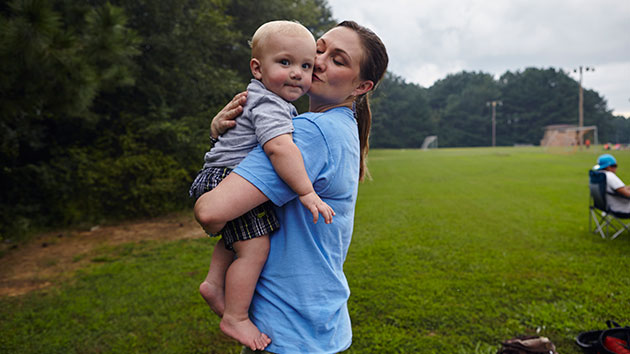
<a href="http://www.istockphoto.com/portfolio/napatcha?facets=%7B%22pageNumber%22:1,%22perPage%22:100,%22abstractType%22:%5B%22photos%22,%22illustrations%22,%22video%22,%22audio%22%5D,%22order%22:%22bestMatch%22,%22portfolioID%22:%5B12825234%5D,%22additionalAudio%22:%22true%22,%22f%22:true%7D">napatcha</a>iStockPhoto
Update, Wednesday, March 23, 2016: A Tennessee House subcommittee on Tuesday voted against the bill that would have made permanent a state law that allows women to be charged for illegal drug use during their pregnancy. As a result, the current law will expire in July.
Update, Tuesday, March 15, 2016: The House Criminal Justice subcommittee heard testimony this afternoon on a bill that will permanently extend Tennessee’s fetal assault law. Among those testifying on Tuesday was Dr. Jessica Young, an obstetrician in Nashville. “I am seeing pregnant women presenting for treatment later in pregnancy—often in the third trimester. They tell me that they have tried to self-detox at home for weeks and months because they are afraid,” Young told legislators, adding that she’s “had patients tell me they are now planning on delivering out of state.” A vote on the bill was postponed until next week.
When she went into labor in late 2014, Brittany Hudson couldn’t go to the hospital. The 24-year-old East Tennessee native had been abusing prescription drugs for years and knew that, under a new state law, if her baby was born showing signs of her drug use, Hudson could be sent to jail. That was the reason she’d forgone prenatal care for most of her pregnancy. Hudson was already in labor when she went with a friend to see a midwife, but it was too late. She gave birth to her daughter in the backseat of her friend’s car on the side of the road, where her friend cleaned her up after. Then she turned around and went home.
“I was afraid I was going to have my baby and they were going to take her,” Hudson told Mother Jones. “I wanted a chance to be a mom.”
Hudson didn’t have much time alone with her new daughter. Someone reported her to law enforcement, and just days after giving birth, she was contacted by the police, who asked her to check in at the hospital, where her newborn, Braylee, went into withdrawal. Almost a week later, while Braylee was still in intensive care, Hudson was arrested, charged with assault, and jailed.
Hudson was charged under Tennessee’s new fetal-assault statute, passed in the spring of 2014 as part of a push to combat an opioid addiction epidemic in the state. The newly revised measure, which is the first law of its kind in the nation, allows the state to prosecute women for illegally using narcotics while pregnant, if the child is born “addicted to or harmed by” the drugs. Courts in Alabama and South Carolina have upheld the prosecution of women for drug use while pregnant, but Tennessee was the first to codify this practice with a state law. Since it took effect two years ago, an estimated 100 women have been arrested under the law, most for using opiates like prescription painkillers and heroin, and there are four known cases where women are serving six-month sentences. At least one woman was arrested for using methamphetamine, a drug not covered by the law. And, due to what advocates in the state say is a major pitfall of the law, pregnant women can be arrested and charged with fetal assault for all illegal behavior. For example, a pregnant woman in her ninth month was arrested in 2014 for “e according to the warrant. What did she do? Drove without a seatbelt. As a result of this law, women have avoided prenatal care and many avoid getting treatment for their drug use because they are afraid they’ll be arrested. After the law’s passage in 2014, the number of Tennessee babies affected by drugs who received no prenatal care skyrocketed.
But the 2014 fetal-assault law contains a sunset provision, and so the portion of the law criminalizing pregnant women’s drug use is set to expire this July. This week, state lawmakers will grapple with whether to let the measure expire or pass a bill permanently prohibiting chemical endangerment in Tennessee. They’ll hear from Hudson, who was eventually convicted under the law, is halfway through her two-year probation sentence, and is now drug free. She and others will testify against the new bill, arguing that it has done more harm than good by criminalizing pregnancy and forcing drug-addicted mothers to avoid prenatal care and treatment for fear of prosecution.
“It has created a hostile environment for doctors and patients because women are afraid to get prenatal care, since once they test positive, they might be charged,” says Cherisse Scott, the founder of SisterReach, a Memphis-based reproductive justice advocacy group that’s opposing the law, adding in an online statement that “women who have been criminalized under this law have not been offered sufficient treatment for addiction.”
Over the last decade, the rate of opioid painkiller prescriptions has shot up across the United States, and with it abuse and addiction. The Obama administration has committed more than $1 billion to combat what the president has described as an “epidemic.” In Tennessee, the problem has been particularly bad: By 2010, Tennessee’s opioid overdose rate was almost twice as high as the national average, and in 2012 Tennessee was the second-highest opioid-prescribing state, after Alabama. That year, the state’s lawmakers enacted the Prescription Safety Act, meant to combat opioid abuse. The statute required that physicians use a centralized database to look up their patients’ records before prescribing more pain medication. But it didn’t make a dent in the problem. Opioid abuse continued to rage throughout the state, and in 2014, the number of opioid-related deaths increased from the year before, surpassing the number of people killed by car accidents or gunshots.
Also on the rise, and increasingly in the public eye, was neonatal abstinence syndrome (NAS), a condition that causes withdrawal symptoms in newborns exposed to opioids in utero. In Tennessee, the number of babies born with NAS has increased nearly tenfold over the past decade, according to state numbers. Rates are highest in eastern Tennessee, where Hudson lives and where 33 percent of NAS cases were caused by the illicit use of drugs.
Lawmakers and state public health officials at the time saw the implementation of a chemical-endangerment measure as a way to encourage drug-addicted women to seek treatment. Legislators added a provision that allowed women to use as part of their defense the fact that they sought treatment, in effect giving pregnant women and new mothers the option of treating their drug problems or going to jail. Republican state Rep. Terri Lynn Weaver, the author of the 2014 law and of this year’s bill, called the strategy a “velvet hammer,” while championing the bill’s passage, adding, “It would seem to me that any society that puts value on life, that these defenseless children deserve some protection.”
When Republican Gov. Bill Haslam signed the bill, he released a statement saying the law was “designed to give law enforcement and district attorneys a tool to address illicit drug use among pregnant women through treatment programs in order to avoid prosecution.”
What Hudson knew about the law at the time was that her drug use could lead to jail time, and that was enough to convince her to go without prenatal care altogether. Already the mother of a toddler, her first visit with an obstetrician wasn’t until her third trimester, when she decided to check to make sure the baby was healthy. “With my first child I went to every doctor’s visit,” says Hudson. “And with the second one I did not. The only thing an addict sees in the law is ‘criminalized, addicted, pregnant women.'”
Evidence suggests that Hudson wasn’t alone. According to unpublished data from the East Tennessee Children’s Hospital, the number of NAS newborns admitted to the hospital’s neonatal intensive care unit having received no prenatal care more than tripled between mid-2014, when the chemical-endangerment law took effect, and the spring of 2015. Meanwhile, the rate of infants born with NAS remained the same.
“The law has had the opposite of its intended affect,” says Allison Glass, state director at Healthy and Free TN, a reproductive and sexual health advocacy group. “It’s driving women away from health care.”
And even for the women who chose rehab, access to treatment was often still out of reach. Toward the end of her pregnancy, Hudson says she sought treatment because she knew she’d be a better mother and that her baby would be healthier. Each time she went to an in-patient drug treatment center, she was turned away, either because they had a policy of not accepting pregnant women or because they had no space. Even after she was arrested for assault, Hudson couldn’t find a treatment center that would accept her, and during the two weeks she spent in jail on a subsequent charge and before making bail, her only option was a once-a-day Narcotics Anonymous meeting. “You put these women behind bars but there’s nothing for them there,” she told me.
According to Glass, of the 39 licensed residential detox programs in the state, only 11 accept pregnant women, meaning there are only about 130 beds available for pregnant women looking to detox in the entire state. And there are just 12 licensed methadone centers, most of which do not accept Medicaid, making treatment there unaffordable for many of the women most affected by addiction. The result is a 1,000-person waiting list for residential programs at any given time, and lost hope for many women seeking care.
“It isn’t accessible, the beds just aren’t there to meet demand,” says Glass. “Proponents say the law forces women into treatment, but there’s nothing in the law that if someone’s charged they’ll be guaranteed space in a program.”
When the measure passed in 2014, opponents of the chemical-endangerment clause said it would open the door for the prosecution of pregnant women for offenses beyond drug use. That’s because the new clause also contained a section that allowed women to be prosecuted for harm done to their own fetuses. Previous versions of the law exempted women from prosecution. The new law said pregnant women were only protected for lawful activity, meaning any illegal behavior could be grounds for additional charges involving the safety of the fetus. “It’s anyone’s guess what police and prosecutors will consider” when deciding what activity harms a fetus, Lynn Paltrow, executive director of the National Advocates for Pregnant women, said in 2014.
Just how arbitrary this process can be was revealed in the winter of 2014, when an eastern Tennessee woman was arrested after driving without a seatbelt and then evading the police. She was charged with three crimes, including felony reckless endangerment because she was nine months pregnant.
A lot has changed for Hudson since she got pregnant with Braylee, over whom she now has joint custody. She eventually got clean, after finding a halfway house that would take her. She now works at a drug treatment center helping pregnant women work on their addictions.
“These are girls that waited to get prenatal care for six or seven months,” she tells me. “They don’t needs judges and jail; they need help. They should have the opportunity to get treatment and not be scared to see their doctor.”








